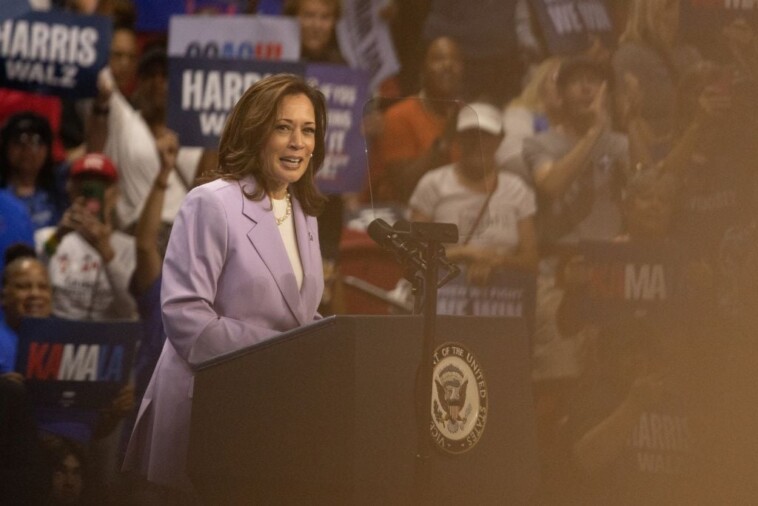Kamala Harris’ perceived anti-Christian rhetoric continues to negatively affect her campaign. Donald Trump has now attacked her for neglecting the Armenian population, historically recognized as the world’s first Christian nation, during Azerbaijan’s invasion.
Trump criticized Harris for her inaction when 120,000 Armenian Christians in Artsakh faced persecution and were forcibly displaced.
“Christians around the world will not be safe if Kamala Harris becomes President of the United States. When I am president, I will protect persecuted Christians, work to stop violence and ethnic cleansing, and restore peace between Armenia and Azerbaijan,” wrote Trump on his social media platform, Truth Social.
The Armenian National Committee of America (ANCA), which advocates for the rights and freedoms of Armenians and allied Americans, reposted Trump’s statement on X:
#BREAKING: Republican Presidential Candidate @realDonaldTrump calls out Biden-Harris Administration for inaction in the face of ethnic cleansing of Artsakh Armenians.
“Kamala Harris did NOTHING as 120,000 Armenian Christians were horrifically persecuted and forcibly displaced… pic.twitter.com/K5aMuR4F4A
— ANCA (@ANCA_DC) October 23, 2024
Reactions to the post were varied, with some expressing gratitude. One user commented, “I think Kamala doesn’t like Christians very much,” referencing an earlier incident where two pro-life students shouted “Christ is Lord” at a Harris rally, only for her to respond, “You’re in the wrong place.”
Although the First Amendment guarantees freedom of speech, religion, and assembly, Harris did not simply disagree with the students; she mocked them. This reaction sparked national and international controversy and underscored the growing radicalization of her rhetoric. In a Fox interview, the students suggested that voters now had a glimpse of what a Kamala presidency would entail—a future where Christians are not respected.
1 Million Armenians Could Impact U.S. Elections
ANCA’s website highlights both presidential candidates’ positions on Artsakh (Nagorno Karabakh), a disputed region between Armenia and Azerbaijan. Both candidates are vying for the support of Armenian-American voters, who number around 1 million and are concentrated in key swing states such as Arizona, Georgia, Michigan, Nevada, North Carolina, Pennsylvania, and Wisconsin.
On September 23, Kamala Harris, the Democratic presidential candidate, expressed support for the “right of displaced Armenians from Nagorno Karabakh to safely return to their homes.” As Vice President, she also stated that “we must never forget the Armenian genocide” and reaffirmed her commitment to a lasting peace between Armenia and its neighbors, ensuring respect for sovereignty and territorial integrity.
However, ANCA acknowledges the gap between Harris’ statements and the Biden-Harris administration’s actions regarding Armenia’s loss of sovereignty in the region, as well as the ethnic cleansing and forced displacement of Christian families by a Muslim-majority nation.
“It’s clear: Armenian votes matter. We saw it today when former President Trump denounced the Biden-Harris administration’s inaction on the ethnic cleansing of Artsakh by Azerbaijan. We saw it a few weeks ago when Vice President Harris called for the safe and sustainable return of Armenians to Artsakh,” said ANCA Executive Director Aram Hamparian in a video message to Armenian-American voters.
“This is a critical moment for our community, marking our emergence as a political force on the U.S. national stage. So, please stay engaged and keep pushing. Our investments in the U.S. political system are paying off,” he added.
Armenians also recall that during Trump’s presidency, his strong relationship with Turkey hindered him from formally recognizing the Armenian genocide of the early 20th century. However, they appreciate that Trump now speaks out against the current ethnic cleansing and criticizes the inaction of the current government, whose Vice President is seeking re-election.
Christian Migrants on the Rise
Trump has also emphasized his pro-Christian rhetoric domestically and internationally, condemning Christian persecution. This contrasts sharply with Harris’ approach. Like the Hispanic population, the majority of migrants to the U.S. are Christian. In fact, the Christian proportion of migrants has doubled with the arrival of Mexicans, Guatemalans, and Filipinos.
For Armenians, Christianity, deeply embedded in their history as the world’s first Christian nation, shapes the ethical and moral framework of their daily lives. While Trump has faced criticism from some Christians for supporting in vitro treatments, he made it clear that he respects the conscience rights of doctors and hospitals opposed to such procedures on moral grounds. In contrast, Harris advocates for compulsory taxpayer funding of such treatments, even for those morally opposed.
As Christians, including Armenians, head to the polls, they will have to decide which candidate better represents their values.

María Herrera Mellado es una abogada de EE.UU. y licenciada en España. Doctora en Ciencias Jurídicas y Analista política. La Dra. Herrera es conocida por su amplia experiencia en análisis y consultas en el diseño de políticas públicas, propuestas de ley y gestión en relaciones internacionales.
Su reconocimiento proviene de sus contribuciones al análisis y representación legal de diversas organizaciones, empresas e individuos que han visto abusados sus derechos humanos, su privacidad o en la inclusión de políticas efectivas fundamentalmente en el ámbito de la transparencia y la rendición de cuentas, así como la lucha contra la corrupción.
Su formación académica y experiencias profesionales la convierten en una voz respetada en el debate público y en el análisis de temas de actualidad sobre todo en los desafíos políticos y legales contemporáneos.
María Herrera Mellado is a U.S.-based attorney also licensed in Spain. She holds a PhD in Legal Sciences and is known as a media legal and policy analyst.
Dr. Herrera is recognized for her extensive experience in analyzing and consulting on public policy design, legislative proposals, and international relations management.
Her recognition stems from her contributions to the analysis and legal representation of various organizations, companies, and individuals whose human rights or privacy have been violated, or who have benefited from the inclusion of effective policies, primarily in the areas of transparency, accountability, and the fight against corruption.
Her academic background and professional experience make her a respected voice in public debate and in the analysis of current issues, particularly in contemporary political and legal challenges.


